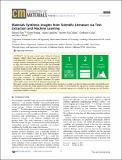| dc.contributor.author | Kim, Edward | |
| dc.contributor.author | Huang, Kevin Joon-Ming | |
| dc.contributor.author | Saunders, Adam | |
| dc.contributor.author | McCallum, Andrew | |
| dc.contributor.author | Ceder, Gerbrand | |
| dc.contributor.author | Olivetti, Elsa A. | |
| dc.date.accessioned | 2021-01-22T22:30:19Z | |
| dc.date.available | 2021-01-22T22:30:19Z | |
| dc.date.issued | 2017-10 | |
| dc.date.submitted | 2017-10 | |
| dc.identifier.issn | 0897-4756 | |
| dc.identifier.issn | 1520-5002 | |
| dc.identifier.uri | https://hdl.handle.net/1721.1/129530 | |
| dc.description.abstract | In the past several years, Materials Genome Initiative (MGI) efforts have produced myriad examples of computationally designed materials in the fields of energy storage, catalysis, thermoelectrics, and hydrogen storage as well as large data resources that are used to screen for potentially transformative compounds. The bottleneck in high-Throughput materials design has thus shifted to materials synthesis, which motivates our development of a methodology to automatically compile materials synthesis parameters across tens of thousands of scholarly publications using natural language processing techniques. To demonstrate our framework's capabilities, we examine the synthesis conditions for various metal oxides across more than 12 thousand manuscripts. We then apply machine learning methods to predict the critical parameters needed to synthesize titania nanotubes via hydrothermal methods and verify this result against known mechanisms. Finally, we demonstrate the capacity for transfer learning by using machine learning models to predict synthesis outcomes on materials systems not included in the training set and thereby outperform heuristic strategies. | en_US |
| dc.description.sponsorship | National Science Foundation (Award 1534340) | en_US |
| dc.description.sponsorship | Office of Naval Research (Contract N00014-16-1- 2432) | en_US |
| dc.language.iso | en | |
| dc.publisher | American Chemical Society (ACS) | en_US |
| dc.relation.isversionof | http://dx.doi.org/10.1021/acs.chemmater.7b03500 | en_US |
| dc.rights | Article is made available in accordance with the publisher's policy and may be subject to US copyright law. Please refer to the publisher's site for terms of use. | en_US |
| dc.source | ACS | en_US |
| dc.title | Materials Synthesis Insights from Scientific Literature via Text Extraction and Machine Learning | en_US |
| dc.type | Article | en_US |
| dc.identifier.citation | Kim, Edward et al. "Materials Synthesis Insights from Scientific Literature via Text Extraction and Machine Learning." Chemistry of Materials 29, 21 (October 2017): 9436–9444 © 2017 American Chemical Society | en_US |
| dc.contributor.department | Massachusetts Institute of Technology. Department of Materials Science and Engineering | en_US |
| dc.contributor.department | Massachusetts Institute of Technology. Institute for Data, Systems, and Society | en_US |
| dc.relation.journal | Chemistry of Materials | en_US |
| dc.eprint.version | Author's final manuscript | en_US |
| dc.type.uri | http://purl.org/eprint/type/JournalArticle | en_US |
| eprint.status | http://purl.org/eprint/status/PeerReviewed | en_US |
| dc.date.updated | 2019-09-23T13:35:39Z | |
| dspace.date.submission | 2019-09-23T13:35:43Z | |
| mit.journal.volume | 29 | en_US |
| mit.journal.issue | 21 | en_US |
| mit.metadata.status | Complete | |
